Tips for staying alive in PlayerUnknown's Battlegrounds
From looting to shooting, everything you need to know to jump confidently into the popular battle royale game.
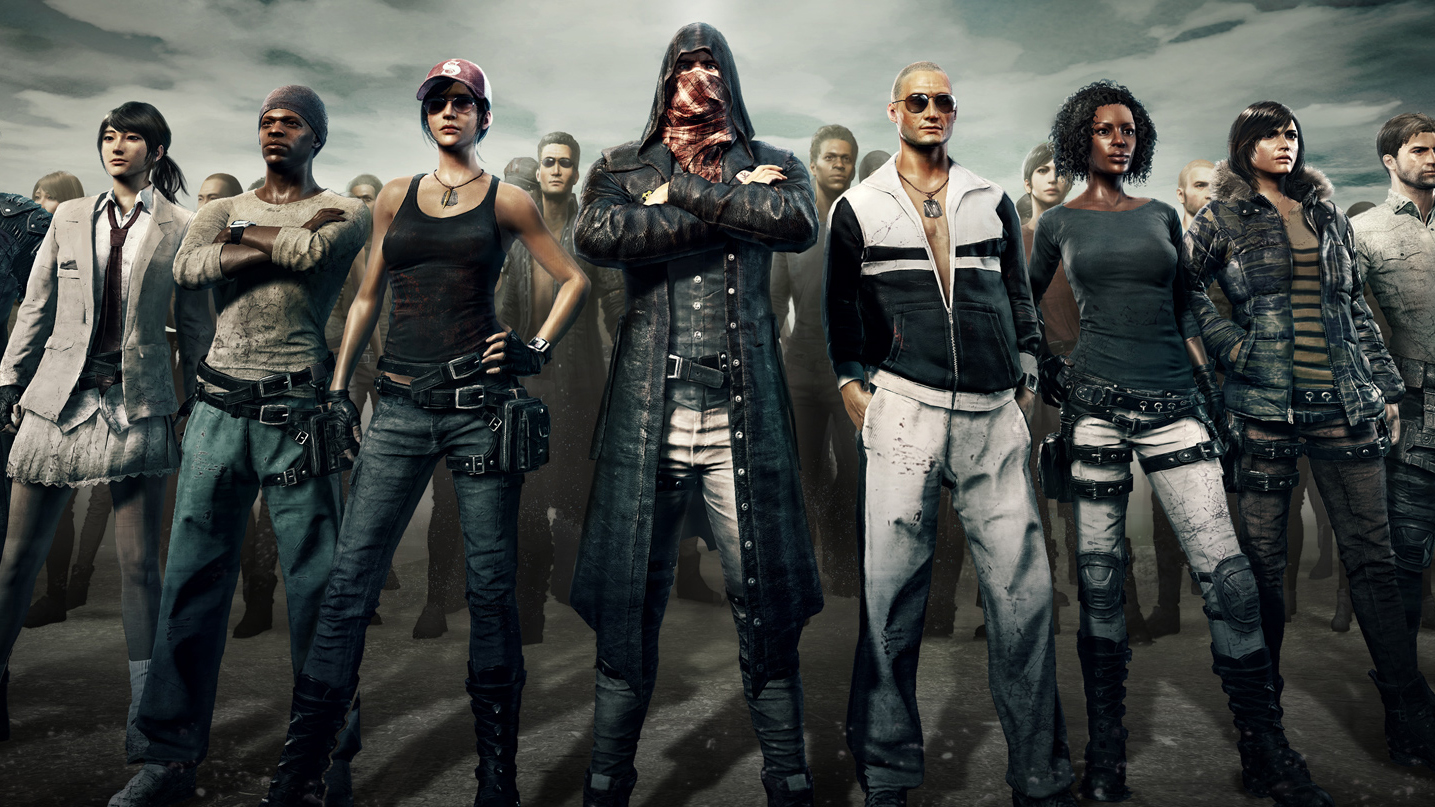
PlayerUnknown's Battlegrounds exploded into Early Access in March and quickly became the PC's most popular battle royale: roughly 100 players parachute from a plane onto a 18x18km island, search for weapons and gear, and fight to the death. All the while, a shrinking circle closes around the island, a blue energy field that damages the health of players caught in it. Players must travel, by foot or in vehicles, into the safe area, drawing closer and closer to the remaining players for a final showdown. The last one left alive wins.
While Battlegrounds doesn't have the raw complexity of Arma, there are still a few things you need to know before your boots hit the ground (and you swap them for different boots). Here are our best tips on staying alive and winning in PUBG.
Follow this guide, and you'll have a shot at being the last one standing.
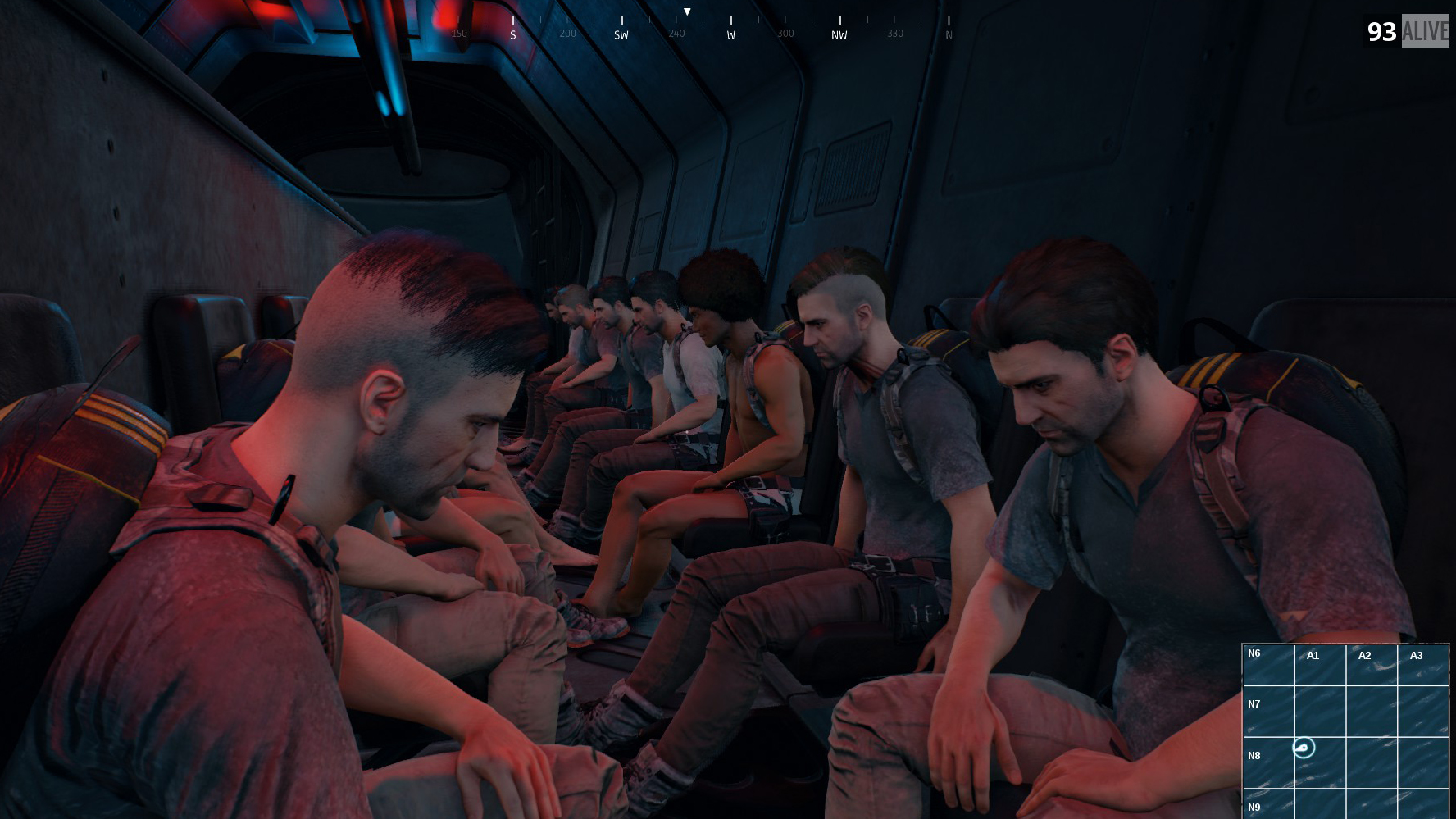
Press Ctrl+T immediately
Ctrl+T mutes voice chat. You will want to do this the moment you enter the lobby, which places all the players on a tiny island together to run around, punch each other, pick up weapons, and blast each other in the face. Your time in the lobby, typically, is under a minute, but trust me: you'll want to mute voice chat right away so you don't have to listen to the players who choose to spend their time in the lobby shrieking or yelling racist slurs.
After a minute in the lobby, you'll appear on the plane with everyone else. The shrieking and slurs will continue, naturally, so don't unmute voice chat, ever, not even for a second.
Land as fast as possible
Hitting the ground before other players is essential, especially if you're landing in an area other players are aiming for, and particularly if it's a zone without much loot. We've actually put together a separate guide on how to land that's full of tips for getting your boots on the ground.
Know your landing zones
Sometimes you may want to land in a zone where there's top-quality loot, but that means more immediate competition from other like-minded players. Other times you might want to begin in a more secluded spot, even if it means a sparser selection of loot. Either way, learning the different areas is important, so we've built a separate article for it. Check out our guide to PUBG's hottest loot spots.
The biggest gaming news, reviews and hardware deals
Keep up to date with the most important stories and the best deals, as picked by the PC Gamer team.
Don’t stop moving
When you’re in an exposed position or in an extended firefight keep moving as much as possible. If you know where your target is, move laterally to them. If you're looting outdoors, hit the Tab (inventory) key, then keep dancing with WASD as you drag items into your inventory with the mouse. Standing still is what gives enemies the time to line up headshots.
Use freelook
Battlegrounds is as much a game of Where's Waldo as anything else, and you've got to use your eyes well to win. Hold the Alt key to move your head, along with the camera, independently of your body. This is especially useful during the aerial decent, when you'll want to be scanning in all directions to spot parachutes.
You should also use freelook to scan for enemies while prone—turning your whole body is more likely to give away your position.
You can swap which shoulder the camera looks over
While in third-person, if you click and hold your right mouse button, then tap Q and E, you can swap shoulder views. This is useful if you're trying to peek different sides of cover or carefully work your way around corners.
Respect the bush
Hiding in a bush might seem like a bad idea, given that a bush offers exactly zero physical protection. Yet, because of how difficult it is to see a player crouched in a bush it’s a remarkably effective hiding spot and can be used to surprise or simply hide. If you’re fighting in the wilderness always give nearby bushes at least a cursory inspection and be aware of your surroundings.
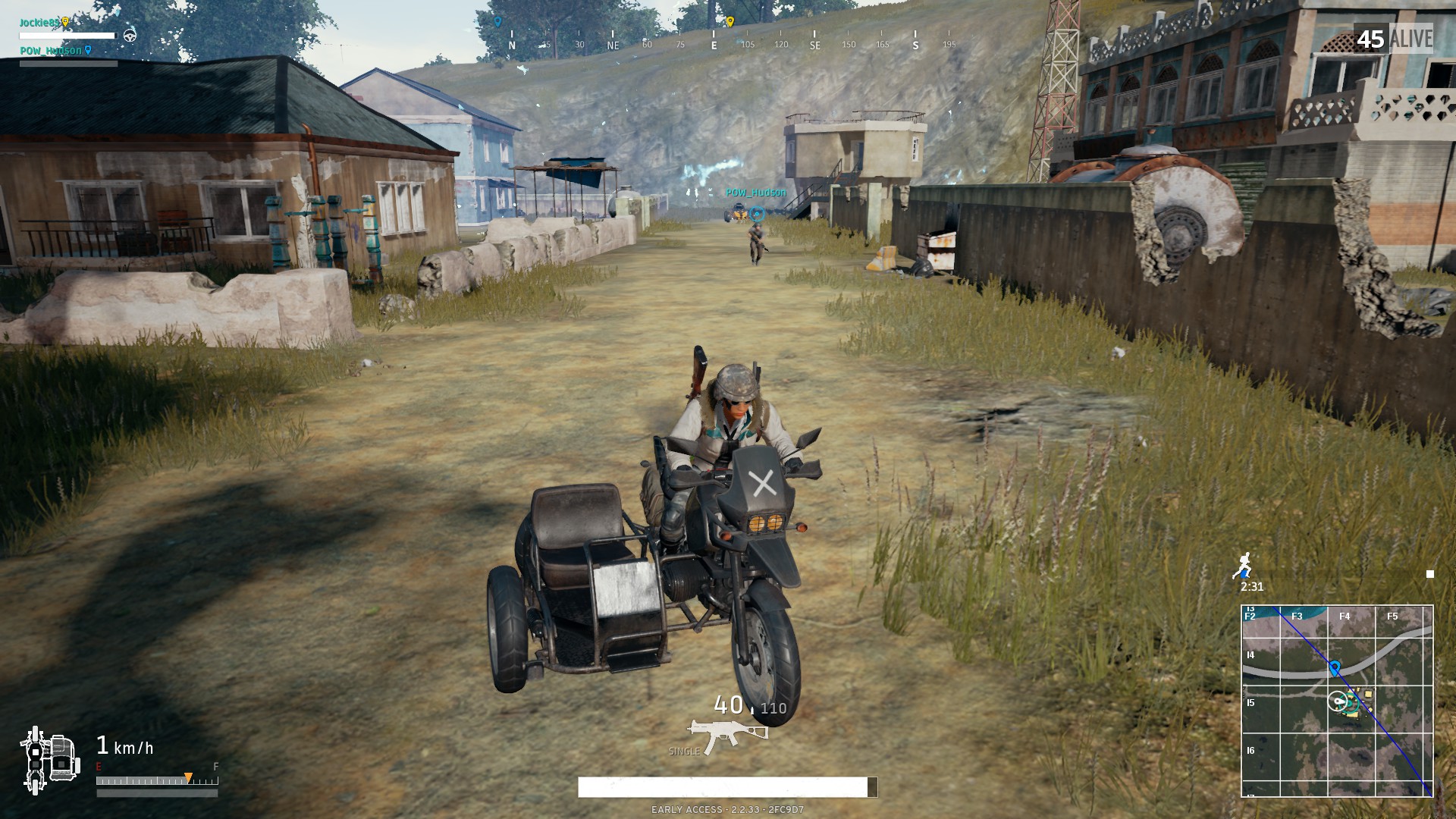
Understanding the electric wall of death that will consume us all
The blue circle is as dangerous as anything else in the late game and can be a source of annoyance throughout as it siphons you towards other players.
From the first moment you're able to jump out of the plane, you have about 1 minute 50 seconds to do some initial looting before the first circle is identified. Here are the timings for each of the circles:
Circle 1: 5 minutes
Circle 2: 3 minutes 20 seconds
Circle 3: 2 minutes 30 seconds
Circle 4: 2 minutes
Circle 5: 2 minutes
Circle 6: 1 minute 30 seconds
Circle 7: 1 minute 30 seconds
Circle 8: 1 minute
Early zones do minimal damage (you can use boost items to entirely mitigate this), however if the energy barrier reaches the next white circle while you’re still outside of it, that damage will double. The base damage goes up progressively with each circle, with late game zones capable of killing you in a matter of seconds.
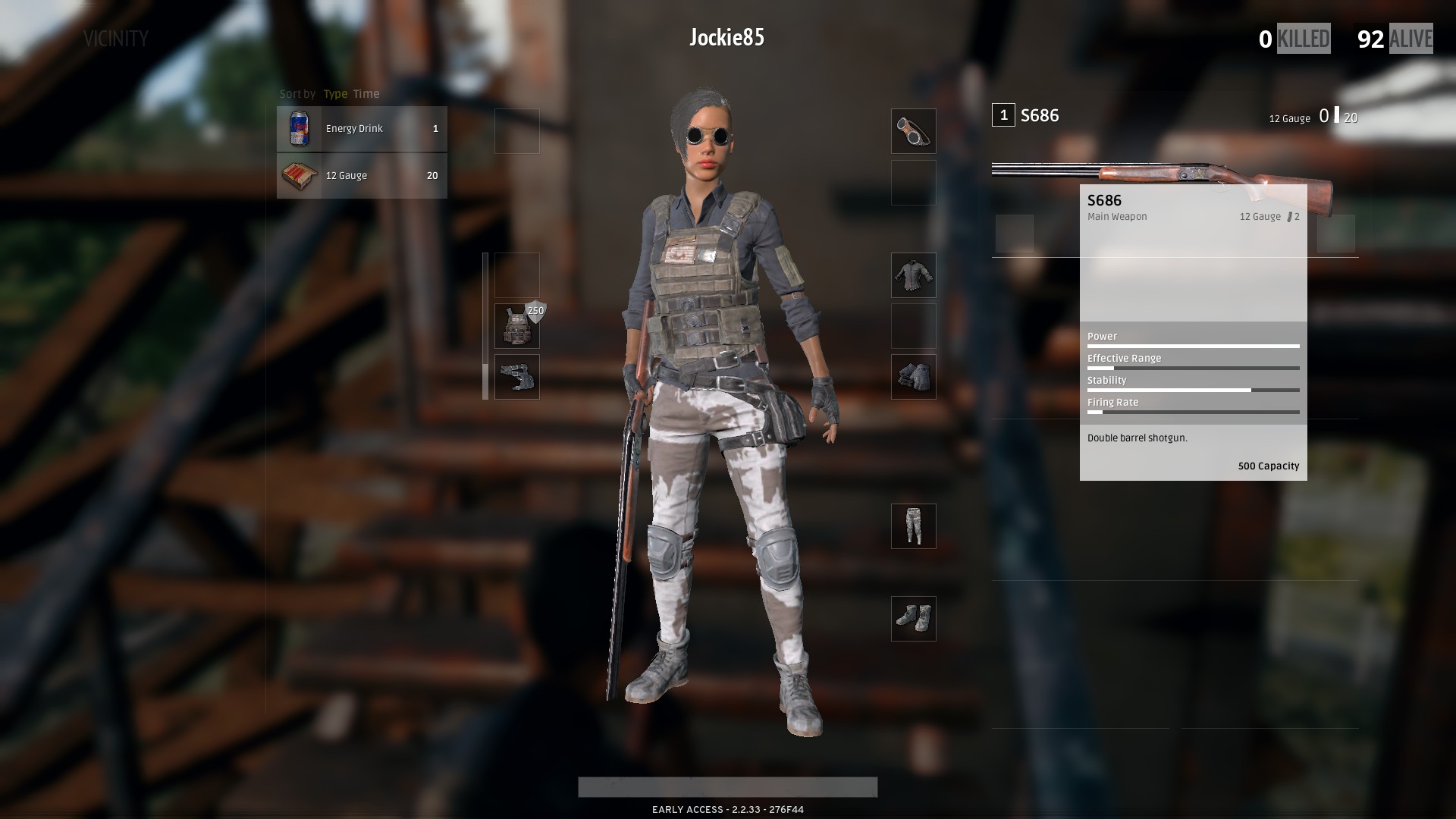
What does armor do?
When I first played PUBG I was picking up cosmetic head choices over motorcycle helmets. Big mistake. The three armor tiers have two sets of statistics: durability, and damage reduction.
The durability tells you how much damage a piece of armor can take before it’s destroyed, damage reduction tells you the percentage of damage the armor mitigates up until it is destroyed, increasing through the tiers. Furthermore a piece of armor is 100% effective up until the moment it is destroyed. That means a Tier 3 helmet with 1 durability will still save you from a Kar 98k headshot.
Tier 1 armor provides 30% damage reduction and has a durability of 80 on the helmet, 200 for the vest.
Tier 2 armor provides 40% damage reduction and has a durability of 150 on the helmet, 220 for the vest.
Tier 3 armor provides 55% damage reduction and has a durability of 230 on the helmet, 250 on the vest.
It’s also worth noting that arms and legs are unaffected by armor, but you take 50% less damage when hit there, while headshots do 2.5x more damage than a chest shot. Effectively, then, arms and legs have permanent 'Tier 2.5' armor.
Full credit to akadiablo2213 for some fantastic testing.
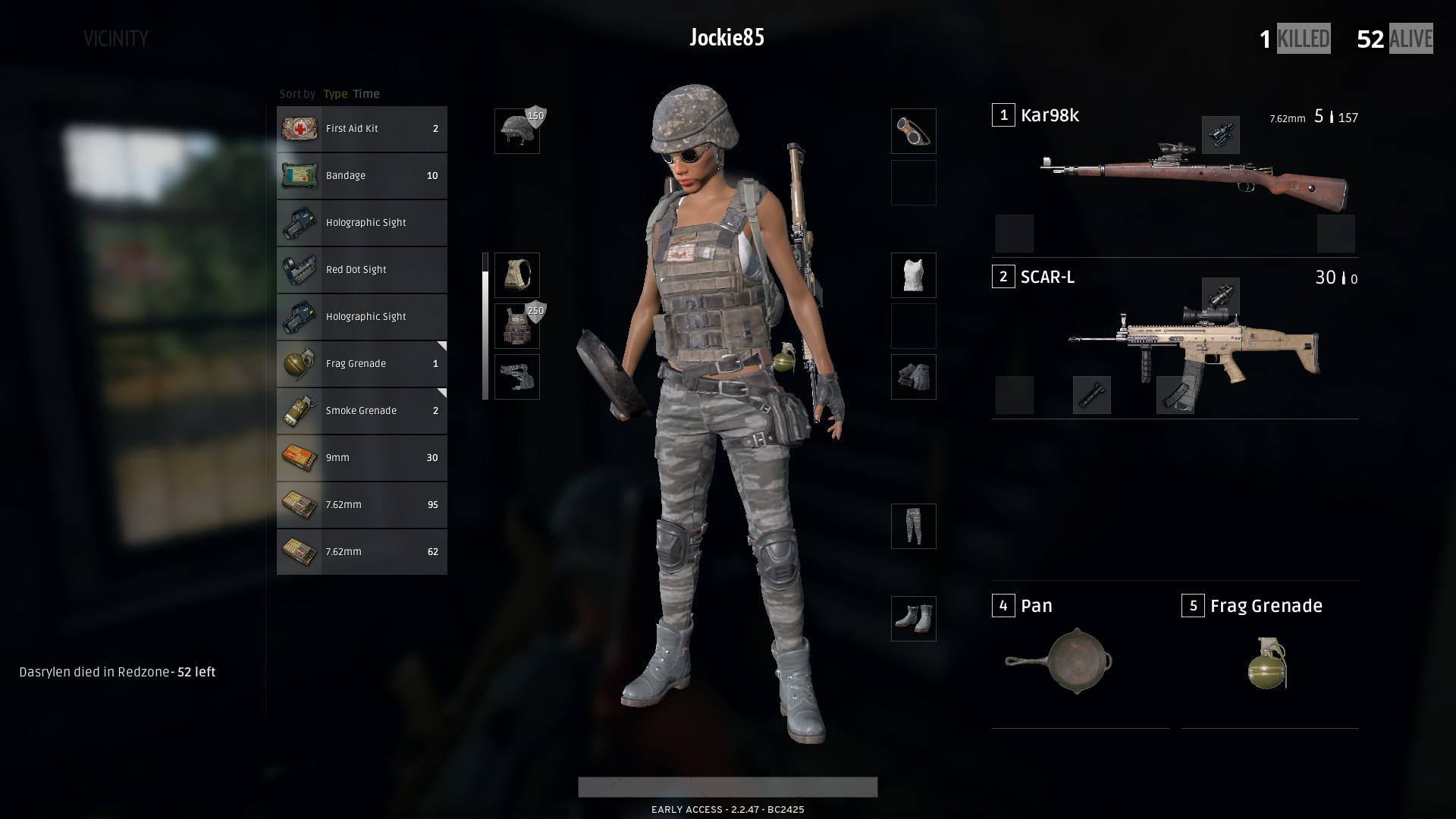
What are the best guns?
There are lots of pistols, SMGs, rifles, and shotguns in PUBG. Luckily, we've put together a separate guide to guns, ranking the best ones in each category so you'll know which ones to look for, and which to pick when you've got to choose between them. Check out our guide to the best (and worst) PUBG weapons here.
Watch out for red zones
There are two circles you need to keep an eye on: the one showing you the safe zone, and the one showing you the blue death-field. But don't forget red zones. Red zones show you an area that is about to be fire-bombed, and with your head down collecting loot or eyes out looking for enemies, it's easy to miss the on-screen text warning you about an impending bombing. You might suddenly realize you're standing in a red zone—it'll show on your minimap as well.
Being in a red zone doesn't mean you're definitely be killed—I've made it through several even as the bombs were dropping—but it's still not a place you want to be if you can avoid it.
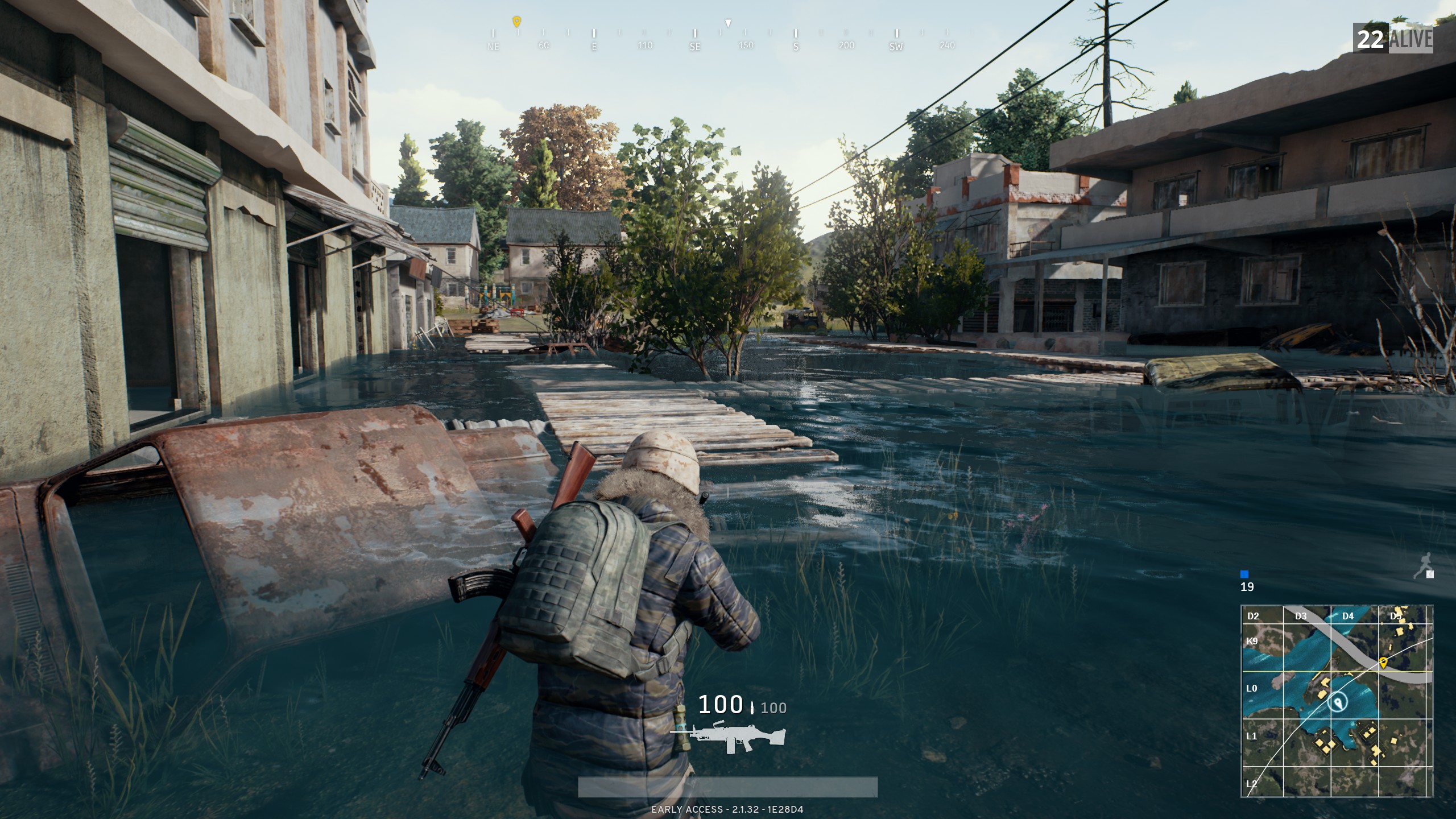
Dive, dive, dive!
If you’re put in a situation where you need to swim or just fancy taking a dip, it’s always worth bearing in mind that while underwater you can’t be hit by bullets (though you will need to surface for air periodically). My former soldier friend tells me this has a basis in reality and that anything below a .20-caliber round will be stopped by 5 feet of water (though he may have learned this from an episode of Top Gear).
Don't kill your teammates
Maybe this sounds obvious, but killing teammates won't just hurt your chances of winning a squad game but may actually get you banned. PUBG has shown it has a zero-tolerance policy for team-killing, and it's being enforced. Killing teammates deliberately can get you banned, killing teammates as a joke can get you banned, and even killing teammates who have killed your other teammates can get you banned.
It's probably best to save your ammo for the enemy.
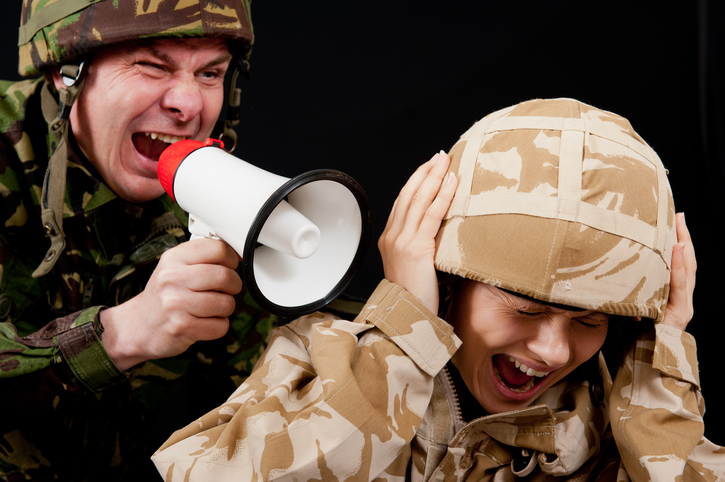
Learn to communicate with your squad
Speaking of teammates, you need to learn how to speak to your teammates: it's a real skill you can hone and improve to make sure your communication is efficient and precise. If you and your friends want to tighten your comms, we've got a separate list of tips for you. Check out our guide on how to communicate in PUBG to keep your squad alive.
Moving faster
When your weapon is unequipped (the X key, by default) you can run slightly faster, perfect if you’re dashing to cover or escaping the blue circle.
Using boost
You may have noticed that when using boost items (painkillers, energy drinks and adrenaline shots) four thin bars above your health bar turn yellow. These represent the four stages of boost, with the following effects.
1 Bar: you will slowly heal over time.
2 Bars: you will heal over time slightly faster.
3 Bars: you will run slightly faster.
4 Bars: you will aim down your weapon sight slightly faster.
Boost is also the only way to get back to 100% health when damaged, other than using a rarely found medkit. If you make it to the late-game and have a stack of boost items, it’s worth keeping your bars topped up even if you have full health.
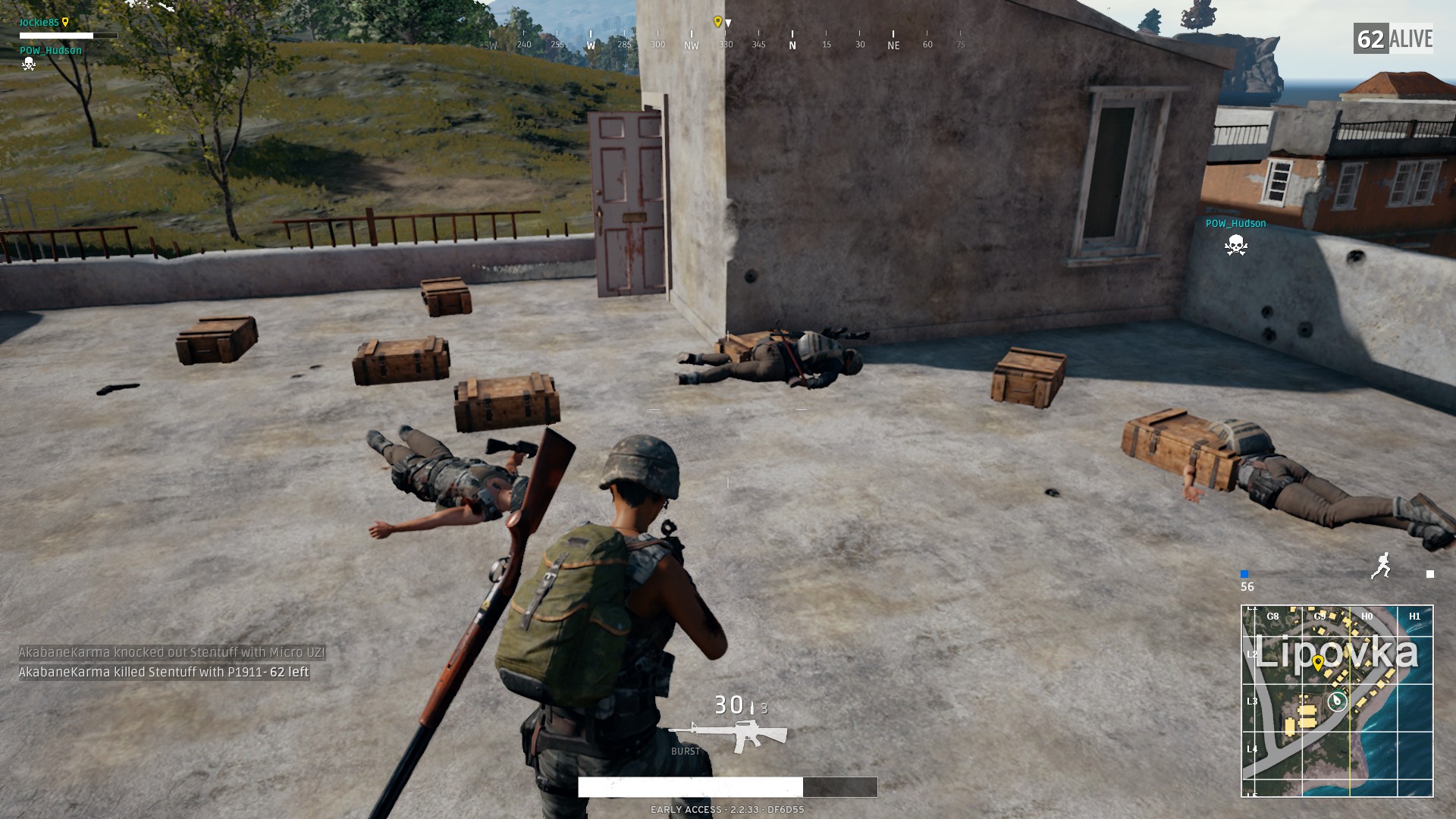
Distance and rangefinding
The PUBG map (including water) is 8km by 8km, divided into 1km2 squares. Zooming in on the map allows you to see further squares denoting 100m2. You can use this to judge distances and estimate how far away a zone, building or player is from your location.
In nearly all firefights, stopping to calculate distances and changing your weapon’s zeroing would not be recommended unless you excel at spatial awareness and in-game geometrics. Instead, you’re best off using aim adjust to aim slightly above your target to account for bullet drop.
One exception to this is sniping. You can roughly mentally map out the distance between your sniping spot and visible landmarks, changing your weapon zeroing to match when you see targets, using the PgUp and PgDn keys by default. It’s worth re-mapping these keys to something more natural (like mousewheel) if you want to use it consistently.
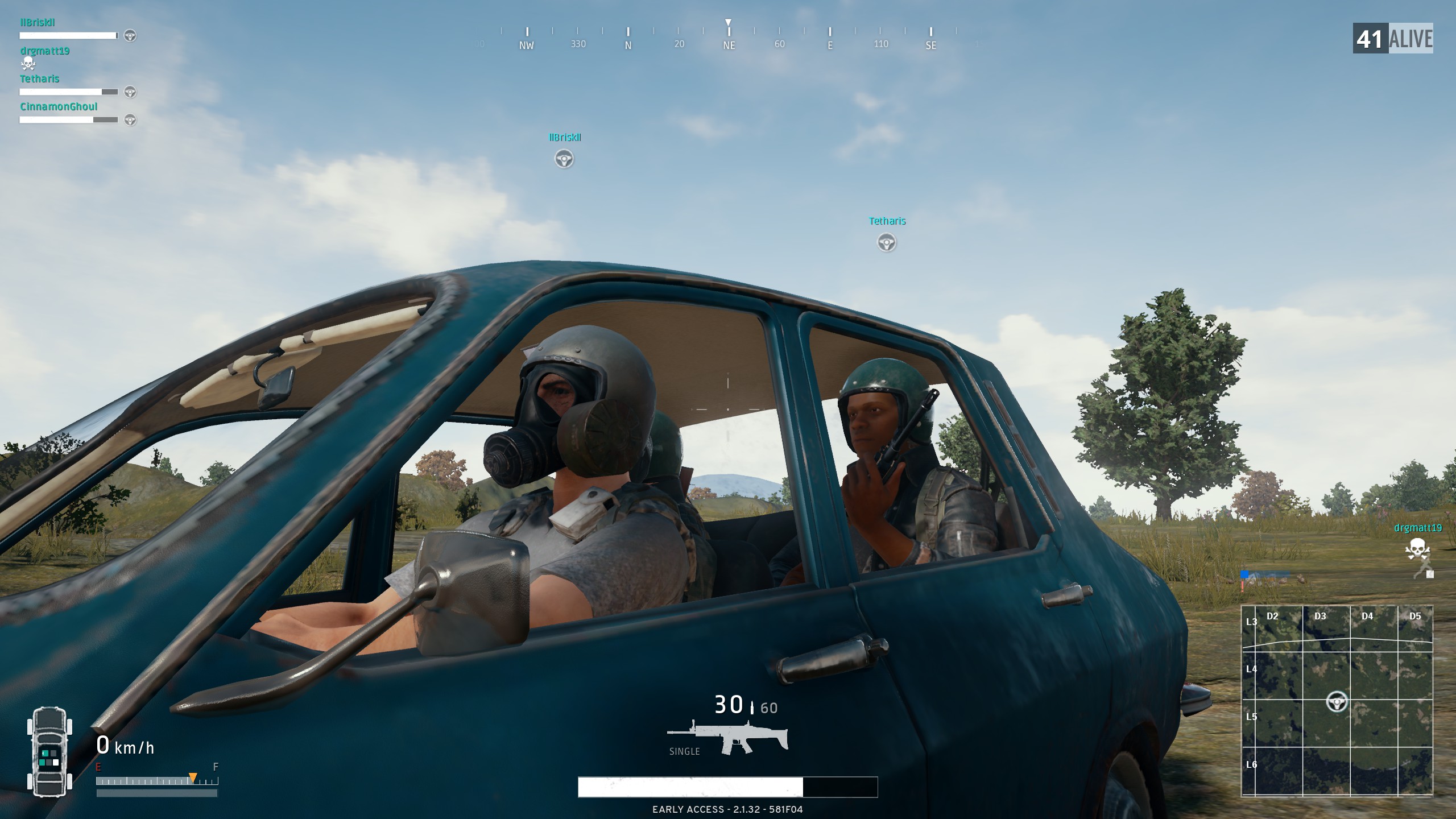
Riding shotgun
If you’re alone, driving a car, you may think yourself entirely defenceless. But simply switching to an unoccupied seat (Ctrl+1, 2, 3, or 4) will allow you to fire your gun while the car is moving. For best results you want to be on flat terrain (like a road), otherwise aiming may prove problematic.
Turn up the volume
Seriously, put on headphones and crank the volume as high as you can without doing damage to your ears. Sound is incredibly important for everything from distant gunfire to really really distant gunfire, car and plane engines, and especially footsteps. While there is a walk button, most players run all the time, and running makes noise. Keep your ears peeled for telltale footsteps, and keep in mind that other players can hear yours as well.
Close doors—usually
Doors, by default, are closed. Upon entering a building, make sure you close the door behind you. Typically, you don't want to announce to other players that you're inside a building, and an open door signifies that pretty clearly. If someone doesn't know you're inside a building, they may just waltz in without a care in the world. In the gif below, I'd closed the door behind me and was looting when someone pulled up in a car (and naturally I heard the car before I saw it).
Since the door was closed, the player had no reason to think anyone was inside, which let me easily kill him even though my aim was pretty shit.
The other benefit of closing doors is when you leave. An open door not only signified you're in a building, but that you have been in a building. Someone coming across a building with a closed door will probably assume the building hasn't been looted, so making them fruitlessly search the rooms and find nothing is a good way to waste someone's time.
Usually. There are times you may want to leave a door open as you leave, to let someone think you're in a building. They'll creep carefully around outside for a couple minutes long after you're gone. Again, wasting other players' time isn't ever a bad idea.
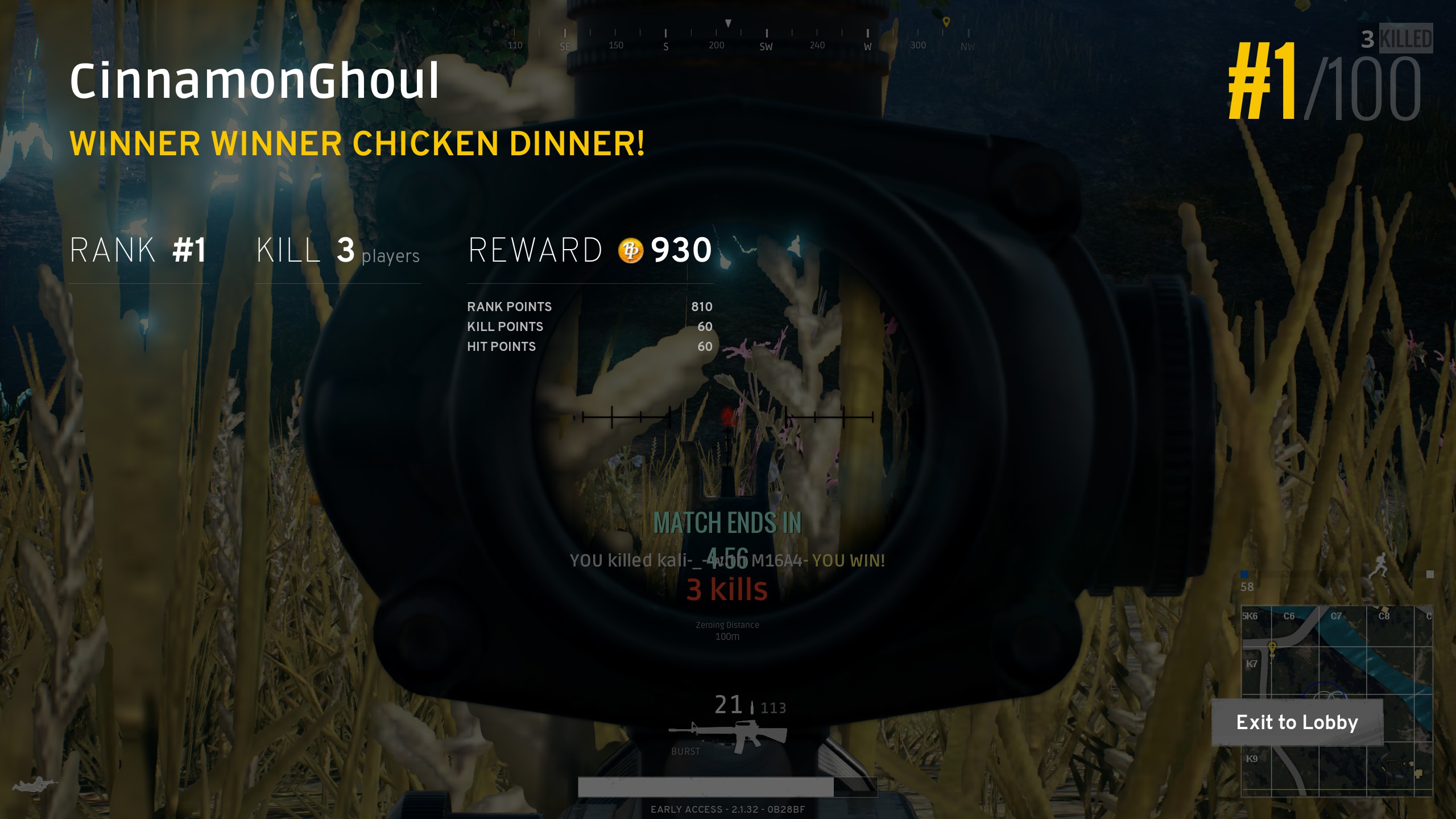

Chris started playing PC games in the 1980s, started writing about them in the early 2000s, and (finally) started getting paid to write about them in the late 2000s. Following a few years as a regular freelancer, PC Gamer hired him in 2014, probably so he'd stop emailing them asking for more work. Chris has a love-hate relationship with survival games and an unhealthy fascination with the inner lives of NPCs. He's also a fan of offbeat simulation games, mods, and ignoring storylines in RPGs so he can make up his own.

